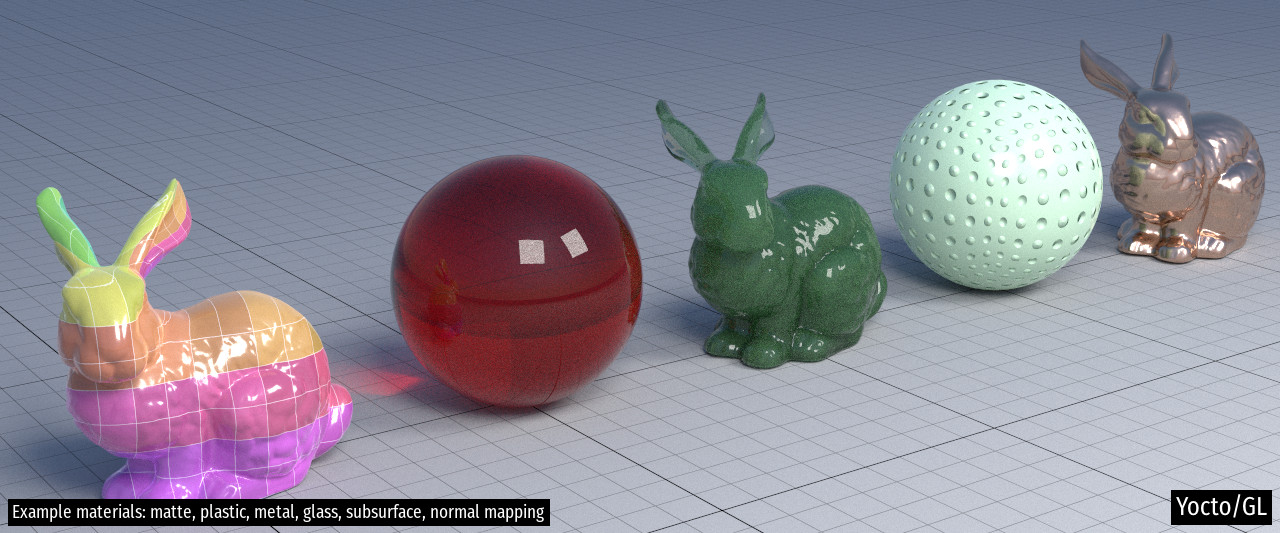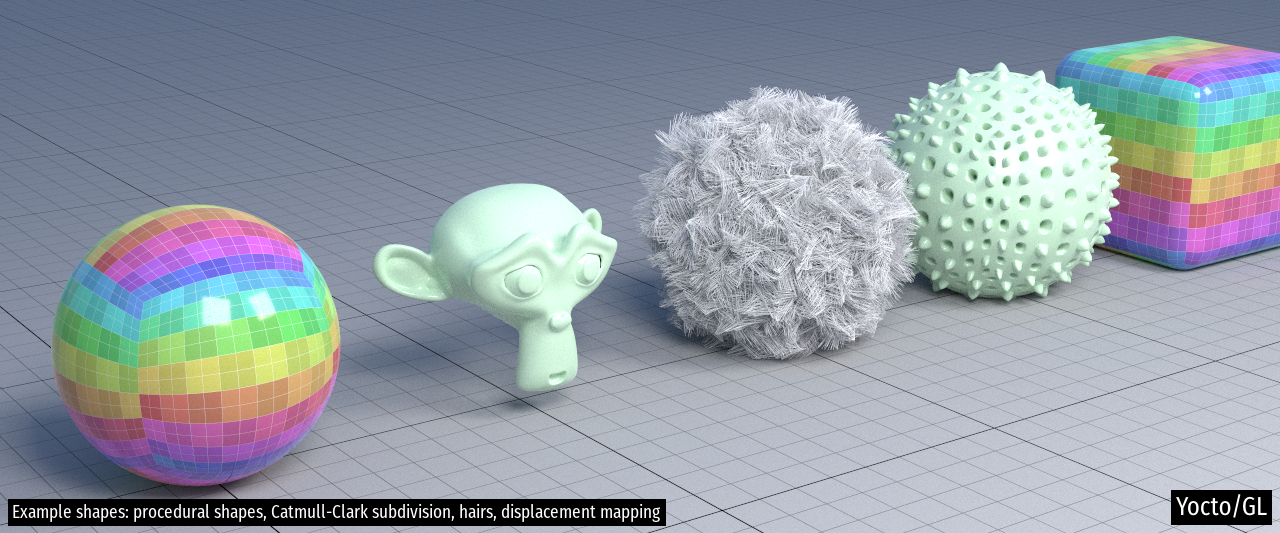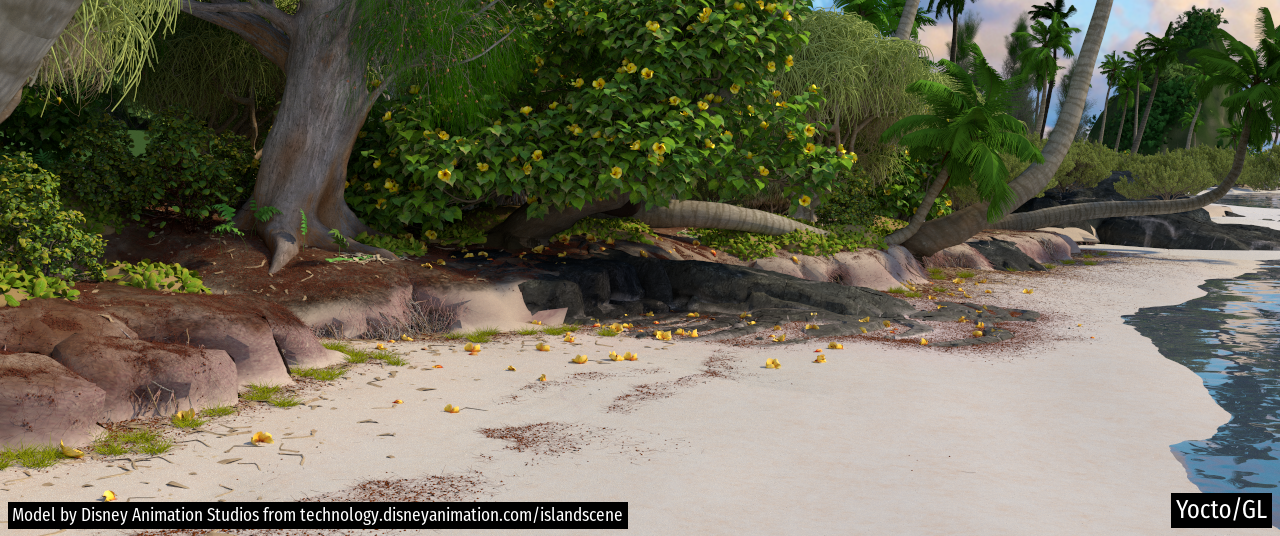Yocto/GL is a collection of small C++17 libraries for building physically-based graphics algorithms released under the MIT license. Yocto/GL is written in a deliberatly data-oriented style for ease of development and use. Yocto/GL is split into small libraries to make code navigation easier. See each header file for documentation.
yocto/yocto_math.{h}: fixed-size vectors, matrices, rigid frames, rays, bounding boxes, transforms, random number generation, color and geometry functions, Perlin noise, shading and integration utilitiesyocto/yocto_shape.{h,cpp}: various utilities for manipulating triangle meshes, quads meshes and line sets, computation of normals and tangents, linear and Catmull-Clark subdivision, mesh loading and saving, procedural shapes generation, ray intersection and closest point queries of triangle meshes, quads meshes, line sets and instances scenes using a two-level bounding volume hierarchyyocto/yocto_image.{h,cpp}: simple image data type, image resizing, tonemapping, color correction, image loading and saving, procedural images, procedural sun-sky, advanced color conversion utilitiesyocto/yocto_trace.{h,cpp}: path tracing of surfaces and hairs supporting area and environment illumination, microfacet GGX and subsurface scattering, multiple importance samplingyocto/yocto_sceneio.{h,cpp}: scene loading and saving of Ply/Obj/Pbrt/glTF and a custom and scalable Json formatyocto/yocto_ply.h: parsing and writing for Ply formatyocto/yocto_obj.h: parsing and writing for Obj formatyocto/yocto_pbrt.h: parsing and writing for Pbrt formatyocto/yocto_commonio.h: printing utilities, file io utilities, command line parsingyocto/yocto_common.h: container, iterators and concurrency utilities
You can see Yocto/GL in action in the following applications written to test the library:
apps/yscenetrace.cpp: command-line path-tracerapps/ysceneitrace.cpp: interactive path-tracerapps/ysceneitraces.cpp: simpler version ofapps/ysceneitrace.cppfor demosapps/ysceneproc.cpp: command-line scene manipulation and conversionapps/yshapeproc.cpp: command-line mesh manipulation and conversionapps/yimageview.cpp: Hdr/Ldr image viewer with tonemapping and color gradingapps/yimageviews.cpp: simpler version ofapps/yimageview.cppfor demosapps/yimageproc.cpp: command-line image manipulationapps/ysceneview.cpp: simple OpenGL viewer
Here are some test images rendered with the path tracer. More images are included in the project site.
Yocto/GL follows a "data-oriented programming model" that makes data explicit. Data is stored in simple structs and accessed with free functions or directly. All data is public, so we make no attempt at encapsulation. Most objects is Yocto/GL have value semantic, while large data structures use reference semnatic with strict ownership. This means that everything can be trivially serialized and there is no need for memory management.
We do this since this makes Yocto/GL easier to extend and quicker to learn, with a more explicit data flow that is easier when writing parallel code. Since Yocto/GL is mainly used for research and teaching, explicit data is both more hackable and easier to understand.
In terms of code style we prefer a functional approach rather than an
object oriented one, favoring free functions to class methods. All functions
and data are defined in sibling namespaces contained in the yocto namespace
so libraries can call all others, but have to do so explicitly.
The use of templates in Yocto was the reason for many refactorings, going from no template to heavy template use. At this point, Yocto uses some templates for readability. In the future, we will increase the use of templates in math code, while keeping many APIs explicitly typed.
We do not use exception for error repoting, but only to report "programmers" errors. For example, IO operations use boolean flags and error strings for human readable errors, while exceptions are used when preconditions or postconditions are violatd in functions.
The current version of the library (2.x) is a major refacting of the previous library versions (1.x) in three main aspects. First, we now allow the use of reference semantric via pointers and adopt it for all large objects, while keeping value semantic for all others. We did this to avoid erroneous copies that cannot detected and avoided at compile time. Second, we had trouble interacting with C libraries that mostly use reference semantic. Third, we reduce the use of exceptions, again for better intergration with external code.
Main contributors:
This library includes code from the PCG random number generator,
boost hash_combine, and public domain code from github.com/sgorsten/linalg,
gist.github.com/badboy/6267743 and github.com/nothings/stb_perlin.h.
Other external libraries are included with their own license.
This library requires a C++17 compiler and is know to compiled on OsX (Xcode >= 10), Windows (MSVC 2019) and Linux (gcc >= 7, clang >= 4).
You can build the example applications using CMake with
mkdir build; cd build; cmake ..; cmake --build .
Yocto/GL depends on stb_image.h, stb_image_write.h, stb_image_resize.h and
tinyexr.h for image loading, saving and resizing, cgltf.h and json.hpp
for glTF and JSON support, and filesystem.hpp to support C++17 filesystem API
when missing. All dependencies are included in the distribution.
We optionally support building OpenGL demos, which are handled by including
glad, GLFW, ImGui as dependecies in apps. OpenGL support might eventually
become part of the Yocto/GL libraries. OpenGL support is enabled by defining
the cmake option YOCTO_OPENGL and contained in the yocto_gui library.
Finally, we optionally support the use of Intel's Embree for ray casting.
At this point, we rely pon prebuilt binaries distributed by Intel.
See the main CMake file for how to link to it. Embree support is enabled by
defining the cmake option YOCTO_EMBREE.


